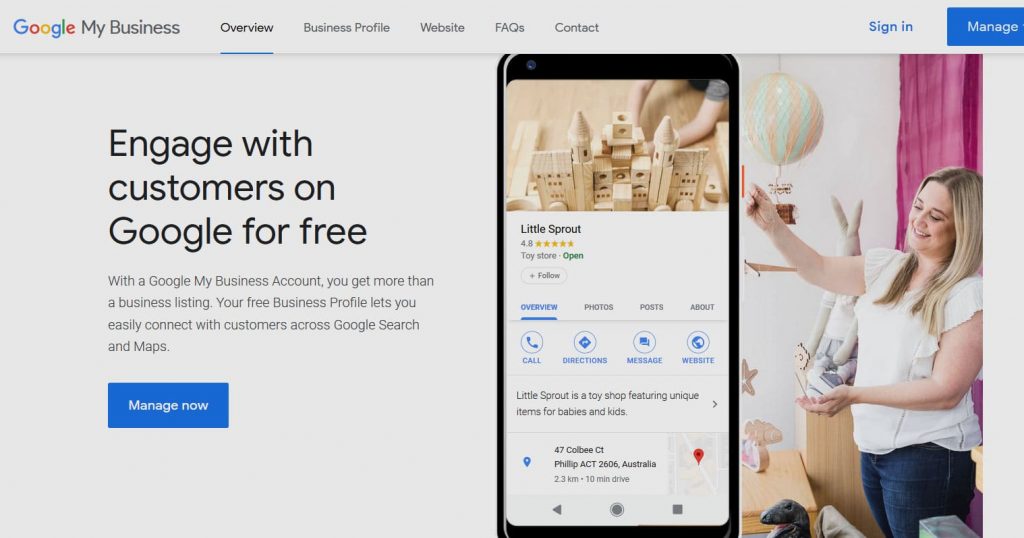What are the basics of SEO or Search Engine Optimisation?
For those of use who have been working with websites since last century, you might think this question should be old hat by now. But it's not.
Only last week I had a dear friend ask me for some thoughts about why his client's website is not ranking.
In the course of a 10-minute conversation, I covered these three basics and on each occasion this hapless business owner had made life hard for Google to help him.
The reason we need to make sure we have these three basics covered is that Google cannot read minds, yet, so we need to make it really easy for the search giant to find, understand, trust, and share our content.
Basics of SEO #1: Your Google Business listing
The first thing I asked was whether or not this gentleman had claimed his free, Google Business listing.
Sadly, he hadn't.
A Google Business listing lets you take some extra steps to verify your ownership of your business in its location to give Google extra confidence when people are searching for businesses like yours, especially when they are in your area.

You can not only stamp your mark on your listing with text, contact details, and photos, but these days Google is encouraging us to post updates directly to our Google Business listings, use the provided URL to seek reviews, and generally turn our listing into an active tool.
However, what I love about it is that it gives us a direct conduit into Google so that the great search engine in the sky gets clear insights into our entity and we get some of its attention.
Ultimately, it is also helping Google boost its directory credentials, so this is definitely a case of I'll scratch your back if you scratch mine.
Until further notice, this should be a mandatory step.
You can see my Google Business listing on Google Search and also on Google Maps.
Basics of SEO #2: Tend your website
Did you know that in this day and age, there are still websites that are not responsive and that are written in abstract business-speak rather than direct, human language?
It's true and I reviewed one for a new client today.
So, here's a mini checklist for you and your webmaster so you can get the basics in order (each of these items is important in gaining Google's trust as well as making visitors feel like they're in the right place):
- Make your website responsive. This means, no matter what size screen they view your site on, they will be able to read it comfortably, without having to pinch the screen or slide side to side to read your content.
- Make your website secure. Apart from having good security with unique, difficult username/password combinations for managing your site, please make sure you get an SSL certificate so that your website address displays as https not just http. Most browsers now warn users if sites do not have a security certificate and that's just one more red light between you and your visitor that you do not need.
- Make your website easy to navigate. Provide a small collection of relevant pages that help users jump straight to the content they're after. More on this later. Having a small menu with five key choices for a user's next click, means you are less likely to have someone leave soon after arriving, which sends a negative signal to Google that your content is irrelevant.
- Make your website fast to load. Think seriously about burdening your website with too many elements that slow down its loading speed. Large images that have not been prepared for the web, extra code and plugins that run actions that aren't necessary for your visitor, using slow web hosting, these are just some of the culprits that hurt the loading speed and SEO of your site. There are many ways to do this and some are captured in the article, 15 easy ways to speed up WordPress. Of note is the suggestion for using a caching plugin like W3 Total Cache.
Basics of SEO #3: Write for humans first
At the beginning of this article, I said we need to be aware that Google can't read minds, yet, so we need to spell things out on on our websites to make it easy for the search giant to understand (and then recommend) our content.
As I was training my 11yo daughter to conduct an interview for an upcoming episode of The Adelaide Show Podcast, I was reminded about how much we take for granted in communication.
For example, my daughter was going to be interviewing a 12yo girl in England who is spearheading a campaign to fund a statue for Mary Anning.
Who is Mary Anning you ask? Precisely my point. Because my daughter is besotted by dinosaurs, she knows Mary Anning was one of the first paleontologists who made some of the most important dinosaur discoveries in history. So I needed to coach her to include that reference in her interview introduction.
The same goes for crafting website content. I often hear new clients complain they are not ranking for the term widget Adelaide when they have never or rarely actually used the term widget Adelaide anywhere across their site.
- So my first point is, we need to be clear and obvious when we write our content. We should follow Stephen Covey's lead and begin with the end in mind. Therefore, determine what searchers you want to be included in (this, of course starts with building empathy for your client or prospect and charting their journey towards your business) and make sure you deliberately include those specific terms in your website content.
- WordPress website users also have the benefit of installing the free plugin, Yoast, which provides a small keyword focus window behind each page. You enter there the term you want this page to rank for, and it provides you with prompts to stay on track.
- Remember, you don't write for robots, you write for humans. Do that succinctly, and the robots (search engines) will follow.
- Other simple things you can do is include links to quality, related content on your various pages. While it can be strange inviting your visitors to leave your site, it wins you many Google "Brownie" points for being seen to be helping visitors get the best information on a topic possible. And that increases your standing with Google.
This post was simply to cover off the basics and there are more points in this excellent Neil Patel article, The 10 most important SEO tips you need to know.
I hope this short article has given you somewhere to start.

